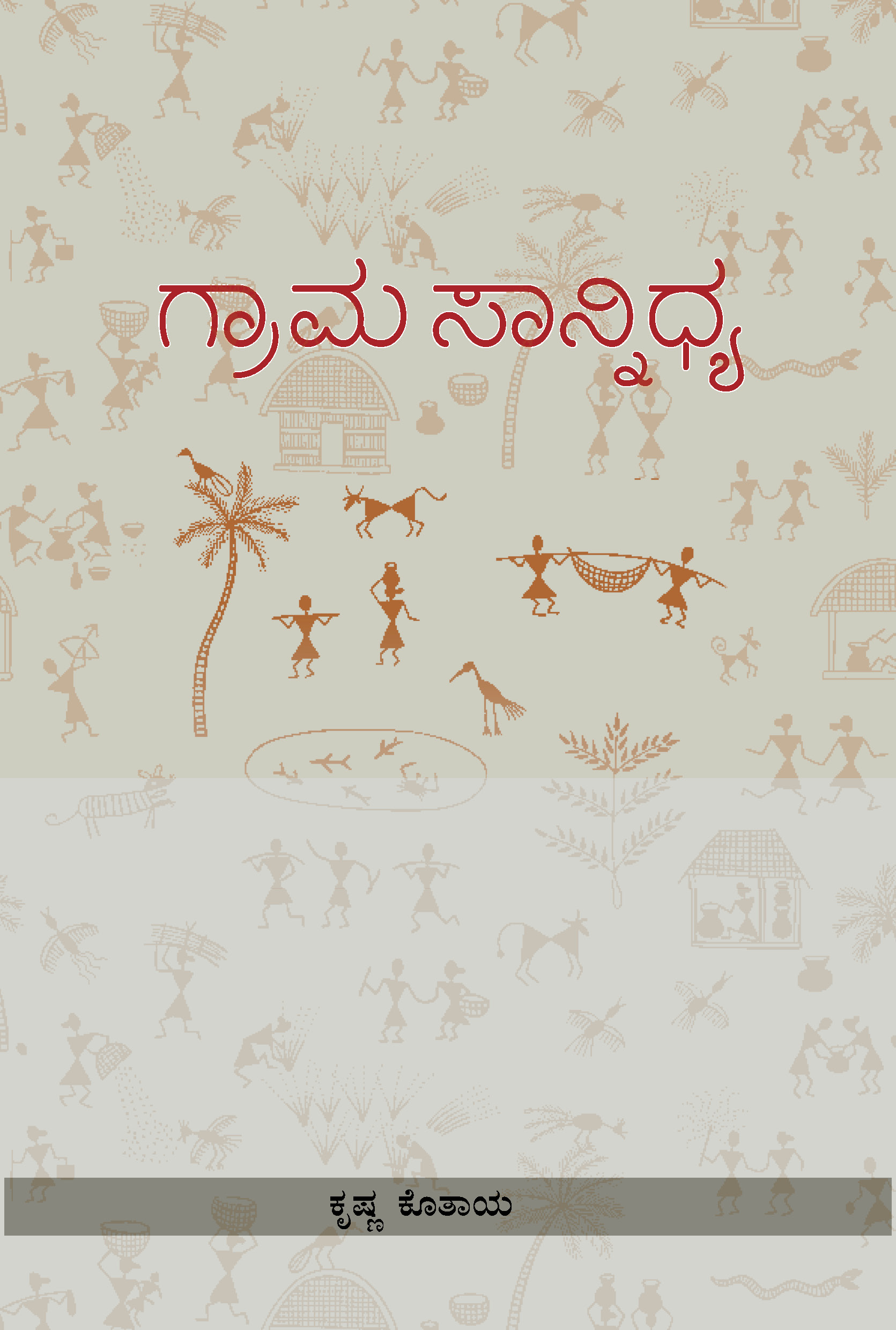Grama Sannidhya
ಗ್ರಾಮ ಸಾನ್ನಿಧ್ಯ
₹300.00
Author: Krishna Kothai
ಗ್ರಾಮ ಭಾರತವೇ ನೈಜ ಭಾರತವೆಂಬ ಉಕ್ತಿಯೊಂದಿದೆ. ಈ ಉಕ್ತಿ ಅತಿಶಯೋಕ್ತಿಯಲ್ಲ. ಪಂಜಾಬ ಸಿಂಧ, ಗುಜರಾತ, ಮರಾಠ, ದ್ರಾವಿಡ, ಉತ್ಕಲ, ವಂಗ ಎನ್ನುವಾಗ ಅಥವಾ ಸುಜಲಾಂ, ಸುಫಲಾಂ, ಮಲಯಜ ಶೀತಲಾಂ, ಸಸ್ಯಶಾಮಲಾಂ, ಮಾತರಂ… ವಂದೇ ಮಾತರಂ ಎನ್ನುವಾಗ ನಮ್ಮ ಕಣ್ಣೆದುರು ಬಂದು ನಿಲ್ಲುವುದು ಭಾರತದ ವೈವಿಧ್ಯಪೂರ್ಣ ಗ್ರಾಮಗಳು, ಅಲ್ಲಿನ ಜನ-ಅವರ ಜನಜೀವನ. ಬದಲಾದ ಹಾಗೂ ಬದಲಾಗುತ್ತಿರುವ ಭಾರತೀಯ ಸಂದರ್ಭದಲ್ಲಿ, ಕೊಳ್ಳುಬಾಕ, ನಗರೀಕೃತ ನಾಗರೀಕತೆ, ಗ್ರಾಮೀಣ ಬದುಕಿಗಿಂತ ಶ್ರೇಷ್ಠವಾದುದೆಂಬ ಒಂದು ಸಿದ್ಧಾಂತ ಯುವಪೀಳಿಗೆಯನ್ನು ಅನಾವಶ್ಯಕ ಅನುಮಾನಗಳಿಗೆ ತಳ್ಳುತ್ತಿದೆ. ಇದೊಂದು ಅರೆಬೆಂದ ಚಿಂತನೆ. ಭೂತಾನದಂತಹ ರಾಷ್ಟ್ರಗಳಲ್ಲಿ ಮನುಷ್ಯನ ಸಂತೋಷ- ಸಂತೃಪ್ತಿಯನ್ನು ಅವನ ಅಭಿವೃದ್ಧಿ ಮಾಪನವಾಗಿ ಬಳಸಲಾಗುತ್ತಿದೆ. ಈ ತೆರನಾದ ಅಭಿವೃದ್ಧಿ ಪ್ರಕೃತಿ ಸಹ್ಯ ಗ್ರಾಮೀಣ ವಾತಾವರಣದಲ್ಲಷ್ಟೇ ಸಾಧ್ಯ-ಷಹರಗಳಲ್ಲಿ ಅಲ್ಲ. ಈ ಹಿನ್ನೆಲೆಯಲ್ಲಿ ಪ್ರಸಕ್ತ ಪುಸ್ತಕವನ್ನು ರಚಿಸಲಾಗಿದೆ. ಅಂತಿಮವಾಗಿ ಅಭಿವೃದ್ಧಿ’ ಎಂಬ ಪದದ ನಿಜಾರ್ಥವೇನೆಂಬ ಪ್ರಶ್ನೆ’ ಪುಸ್ತಕದುದ್ದಕ್ಕೂ ಕಾಡುತ್ತ ಹೋಗುತ್ತದೆ. ಹಲವು ವರ್ಷಗಳಿಂದ ಲೇಖಕನನ್ನು ಕಾಡುತ್ತ ಬಂದ ಪ್ರಶ್ನೆ’, ಪುಸ್ತಕದ ವಿವಿಧ ಅಧ್ಯಾಯಗಳಲ್ಲಿ ತಲೆ ಎತ್ತಿ, ಗೊಂದಲ ಸೃಷ್ಟಿಸುತ್ತವೆ. ಸುಮಾರು ಆರು ದಶಕಗಳಿಗೂ ಹೆಚ್ಚಿನ ಗ್ರಾಮೀಣ ನೆಲದ ಸಂಪರ್ಕ, ವಿಶಿಷ್ಟ ಅನುಭವಗಳು, ಅಪಾರ ಸಂದೇಶಗಳನ್ನು ಪುಸ್ತಕದಲ್ಲಿ ದಾಖಲಿಸಲಾಗಿದೆ. ಗ್ರಾಮೀಣ ಬದುಕಿನ ಅನನ್ಯತೆಯನ್ನು ಅನಾವರಣಗೊಳಿಸುವ ಕಾಯಕವನ್ನು ಈ ಪುಸ್ತಕದಲ್ಲಿ ಮಾಡಲಾಗಿದೆ. ಐವತ್ತನೆಯ ದಶಕದ ಗ್ರಾಮೀಣ ಬದುಕನ್ನು, ಅಂದಗಾರಿನ ಊರು, ದೇವಸ್ಥಾನ, ಶಾಲೆ, ಗ್ರಾಮೀಣರು, ಅವರ ಬದುಕಿನ ಪರಿ, ಜೀವನಾನುಭವ, ಸ್ನೇಹ ಭಾವ, ಸಜ್ಜನಿಕೆ, ತೃಪ್ತ ಜೀವನ ಇನ್ನಿತರ ವಿವರಗಳೊಡನೆ ದಾಖಲಿಸಲಾಗಿದೆ. ಅದಕ್ಕೆ ಪರ್ಯಯವಾಗಿ, ಬದಲಾದ ಇಂದಿನ ಅಂದಗಾರನ್ನು (2020) ಚಿತ್ರಿಸಲಾಗಿದೆ. ಇದರ ನಡುವೆ ರಾಜ್ಯದ ಬೇರೆ ರಾಷ್ಟ್ರಗಳ ಗ್ರಾಮೀಣ ಬದುಕಿನ ವಿವರಗಳನ್ನು ಕೊಡಲಾಗಿದೆ. ಲೇಖಕನ ಬದುಕಿನಲ್ಲಿ ಹಾದು ಹೋದ ಗ್ರಾಮವರೇಣ್ಯರ ನೆನಪು ಈ ಪುಸ್ತಕದಲ್ಲಿದೆ. ಗಾಂಧೀಜಿ ಪ್ರಣೀತ ಪ್ರಕೃತಿಯೊಡನೆ ಸದಾ ಅನುಸಂಧಾನದಲ್ಲಿರುವ, ಸ್ನೇಹ, ಸಹೃದಯತೆ ಸದಾಚಾರ, ಸಹಬಾಳ್ವೆ, ಸಂತೃಪ್ತಿಯ ತಂಗುದಾಣಗಳಾದ ಸಹಸ್ರಾರು ಹಳ್ಳಿಗಳ ರೂಪಕವೊಂದನ್ನು ಒದಗಿಸುವ ಪ್ರಾಮಾಣಿಕ ಪ್ರಯತ್ನ ‘ಗ್ರಾಮ ಸಾನ್ನಿಧ್ಯ’ ಕೃತಿಯಲ್ಲಿದೆ.
Interested overseas customers may write to us at mup@manipal.edu about purchasing the book.
| Author | |
|---|---|
| Format |









